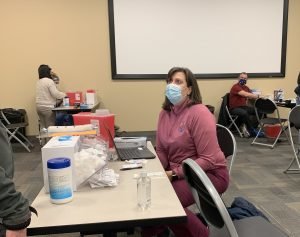Submitted

Nurse prepares to administer COVID-19 vaccinations at the Manassas George Mason Campus Beacon Hill clinic.
Update on Virginia COVID-19 Regulations:
Gov. Northam announced on Jan. 27 that Virginia’s current COVID-19 regulations, which were set to expire on Jan. 31, will continue through Feb. 28. The regulations are outlined below:
- Modified Stay at Home Order: Everyone in Virginia must remain at home between the hours of 12 a.m. and 5 a.m. Exceptions include obtaining food and goods, traveling to and from work, and seeking medical attention.
- Universal Mask Requirement: All Virginians aged five and over are required to wear face coverings when they are indoors around others and when they are outdoors within six feet of another person.
- Reduction in Social Gatherings: All social gatherings, whether they are indoors or outdoors, are limited to 10 people. Social gatherings include, but are not limited to, parties, celebrations or other social events. This does not apply to religious services or employment or educational settings. Restaurants and retail stores already follow strict social distancing requirements and are not included in this limit.
- Continued Limits on Dining Establishments: Virginia restaurants follow strict social distancing and sanitization requirements. The on-site sale, drinking and possession of alcohol is prohibited after 10 p.m. in any restaurant, dining establishment, food court, brewery, microbrewery, distillery, winery or tasting room. All restaurants, dining establishments, food courts, breweries, microbreweries, distilleries, wineries and tasting rooms must close by midnight.
Key Points:
- All states rely on the federal government to distribute vaccine doses. Based on our population, Virginia is currently receiving approximately 105,000 new doses each week toward our goal of achieving herd immunity. The pace of incoming doses may not significantly increase for months, although President Biden has announced plans to increase distribution by 16% in the near future.
- The Virginia Vaccine Summary Dashboard is updated to provide clearer, more accurate information. It now shows that most of the first doses available to Virginia have been administered.
- Virginia’s main distribution of doses is provided by the Virginia Department of Health to local health districts, based on each district’s population. Local health districts are expected to decide the fairest, most efficient use of their vaccine allocation, using their own staff and volunteers, hospitals, pharmacies, and other healthcare providers to administer the vaccine. Some residents receive doses through separate federal allocations if they work for the U.S. Department of Defense and certain other agencies, are associated with the Indian Health Service or can participate in a federal contract that CVS and Walgreens have to vaccinate residents of long-term care facilities.
- All local health districts in Virginia have moved into Phase 1b of vaccine eligibility. This means that approximately 50% of Virginia’s population is now eligible, including frontline essential workers, people aged 65 years and older, people with high-risk medical conditions identified by the CDC and people living in correctional facilities, homeless shelters and migrant labor camps. Other than the healthcare workers and residents of long-term care facilities in Phase 1a, the Virginians in Phase 1b are at the highest risk of exposure to COVID-19 or serious illness if infected.
- While local health districts are allowed flexibility in how doses are administered to eligible individuals, roughly half of the available supply should be used for people aged 65 or older. The other half should be used for frontline essential workers, people with high-risk medical conditions as identified by the CDC; and people in correctional facilities, homeless shelters and migrant labor camps. Frontline essential workers should be prioritized in the order listed in the Phase 1b details.
- There are simply not enough doses available yet for everyone who is eligible to receive them. Virginia is not likely to meet the demand for Phase 1b until March or April.
- Anyone eligible for Phase 1a or 1b based on occupation should check with their employer to see if arrangements have already been made, and should otherwise register with the local health department in the locality where they work. Anyone eligible based on age or medical condition should register with the local health department in the locality where they live.
- Assistance in English, Spanish, and other languages is also available through the VDH Call Center at 877-ASK-VDH3 (877-275-8343). The Commonwealth is investing in a significant expansion of call center capacity in the coming weeks and is working with local health districts to ensure information and registration is available on their websites and by phone.
- Unfortunately, it may be weeks or longer before vaccination appointments become available for those who have registered.
- Anyone who receives a first dose of vaccine will receive the second dose three or four weeks later, as appropriate. Vaccine providers should not hold back their current supply for second doses. They will receive second doses in proportion to the first doses they administer.
Important Takeaways:
- Because approximately 50% of Virginia residents are now eligible to be vaccinated, the limited supply of vaccine from the federal government means it will take months to complete Phase 1b unless supply improves.
- It is more important than ever to take the same precautions as always: staying home when possible, wearing masks when out, maintaining physical distance from others, washing hands frequently and other best practices.
For PWHD Updates: VDH.virginia.gov/prince-william
CDC Vaccine Information: Coronavirus Disease 2019 (COVID-19) | CDC
For updates on the County’s COVID-19 response and vaccination support efforts:
 Nurse prepares to administer COVID-19 vaccinations at the Manassas George Mason Campus Beacon Hill clinic.
Nurse prepares to administer COVID-19 vaccinations at the Manassas George Mason Campus Beacon Hill clinic.